

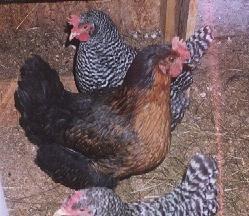
When we started out raising baby chicks we did as we were advised, medicated feed and vaccinations. Well, to cut a long long story short, we have found from bitter experience that the chicks do BETTER if they have NO medicated feed and no shots. We even raise our baby turkeys without medicated feed, which is supposed to be a no-no. Of course our experience in raising chicks has increased over time, but the year we switched from the "recommended way" to the natural way we saw a dramatic difference. For a start it was the first year we had zero losses among turkey poults. If you buy chicks from a reputable source they arrive healthy. Disease arrives on your farm from sick birds, OK, I know that's obvious, but if you buy healthy animals, and keep them away from unknown birds you don't need vaccinations, it's a no-brainer. We have never lost a bird to Marek's, we have never HAD Marek's. In my opinion, any hatchery who insists this is necessary doesn't trust it's own flocks for health. Most of our chicks these days are farm-born anyway, and the meat birds come from a hatchery we trust. If we buy birds from breeders they get isolated until we are satisfied they are disease-free. These simple steps mean our flock is very healthy, and the only outbreak we've had is cocci, which is very hard to avoid completely, as it can arrive on visitors shoes etc. In my experience birds raised on natural feed fight this off, while those who were started on medicated feed succumb to it. We raise big, healthy meat birds on pasture, feed as much grain as we can from our own land and from friends who grow organically and we're very picky about what feed we buy in, it comes from only one reliable source. We don't touch branded feeds, but have custom scratch and lay mixes done at the mill, which while not guaranteed organic, comes from sources locally that we know are too damn poor to bother with GE seed and pesticides!!! Here are our recipes for the mill:
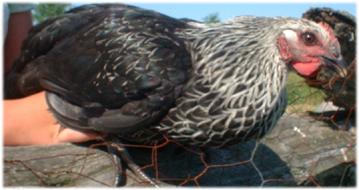
Lay ration
50kg wheat meal
50kg yellow cornmeal
50kg oats, barley, or rye as available, or a mix
14kg dried milk
9kg oyster shell
2kg sea salt
They don't need much of this, and if you let them forage
on pasture they
find their own protein.
In Winter if they are laying, include some protein.
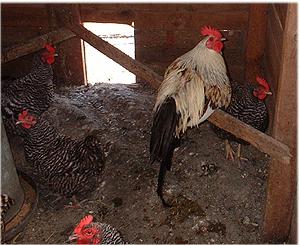 Meat bird ration:
Meat bird ration:
150kg barley meal
50kg wheat meal
14kg dried milk
25kg COOKED soya meal or peameal
9kg oyster shell
2kg salt
Starter ration for meat birds:
14 kilo mixed grains, wheat, corn, oats
6kg COOKED soya meal or peameal
6kg alfalfa meal
1kg oyster shell
1/2 kg cod liver oil (or serve with dried milk or fresh, and only add a
little)
1/2 kilo salt
Starter ration for other chicks, suitable for meat birds if in no hurry:
Any grain meal mixed with dried milk (or can be made on the spot with fresh
if you have it, goat's is best)
Chicks hatched in the barn by Mom get no special chick feed but learn to
fend for themselves immediately
Most feed stores only stock medicated chick feed. Buy DUCK starter instead in this case, we've used this with great success.
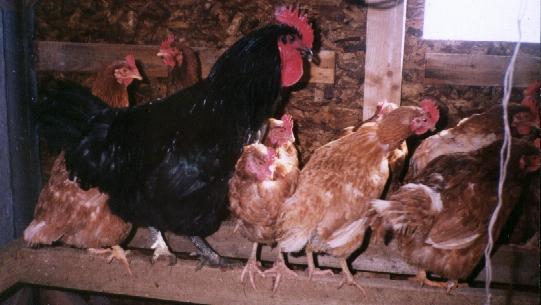
Bear in mind all of this anticipates the birds getting everything else they need by finding it around the farm, or in a large run. Quite frankly if you have enough hens and only need eggs for yourself you never need feed them anything extra in Summer at all. They can get 25% of their food, and ALL their protein from scratching in grass. Birds kept off grass will need more dietary supplements, and they all need extra in Winter. We offer all our birds kitchen scraps all year round. There is no waste here! Allow them access to the compost heap if practical as soon as you can. We have found that moving chicks is very stressful, and it has been at these times that we've had losses. We now set up brooders inside larger coops, so that when the heat lamp goes off they are already in familiar surroundings, their permanent home.
There is some debate about using soya as a feed. We do, but there are alternatives around such as peameal noted above, beans, alfalfa, peanut, linseed, etc etc and you can offer meat such as bacon instead, or even fish if you have a supply. We are experimenting with lupin seed, and we get a field of flowers as a by-product, neat:) Protein is only a big issue with meat chickens anyway. Brand name feeds contain meat and fish meal, and who knows where it comes from. My guess is diseased carcass and roadkill.

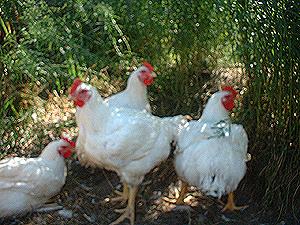
The debate continues internationally about what to do with dirt on eggs. In England my husband's Aunt, who is only a small-time homesteading producer, who sells her surplus at market, is not permitted by law to wash her eggs, AT ALL. Any eggs laid that are dirty can only be rubbed with a dry cloth. She finds this a real bind. On the other hand here in North America we have commercial eggs washed in disinfectant. Now then, the reason given for NOT washing eggs in England is that the shells are porous (true) and the dirt actually gets forced inside. Therefore it follows that all eggs washed in disinfectant contain.....guess:) We wash our eggs in cold running water using a brush. No-one has ever got sick from this, but then, our hens are healthy.
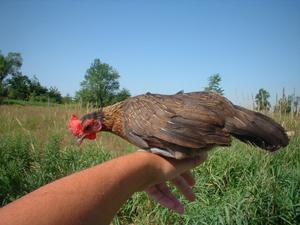 As well as issues about feed I'm often asked about housing for chickens. People ask me some very precise questions, but you know, this isn't an exact science. Chickens are very easy-going, and will make do with very simple accomodation. But I'm aware that beginner may need some guidelines, so I have put together my "Real Estate for Feathered Friends" guide:)
As well as issues about feed I'm often asked about housing for chickens. People ask me some very precise questions, but you know, this isn't an exact science. Chickens are very easy-going, and will make do with very simple accomodation. But I'm aware that beginner may need some guidelines, so I have put together my "Real Estate for Feathered Friends" guide:)